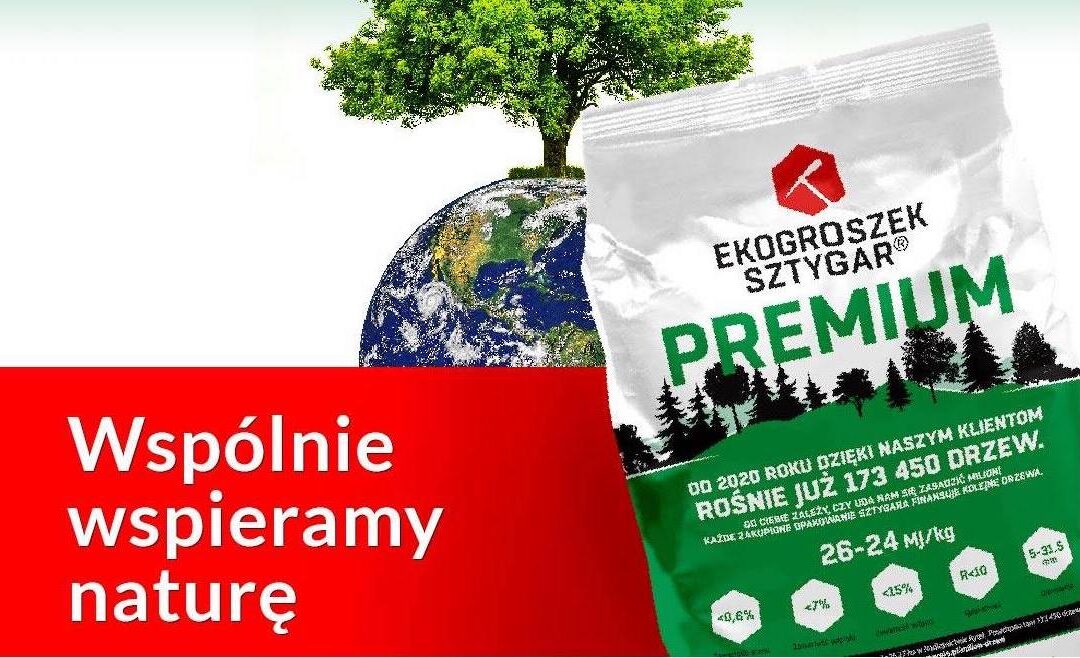An environmental charity is suing the producer of a popular type of heating coal for using a name and packaging that unfairly suggest eco-friendliness. ClientEarth wants the “unfair market practice” to be stopped, but the company denies allegations of greenwashing and claims that it is correctly applying the product name used by regulators.
The “eco-pea” (ekogroszek) heating coal has been growing in popularity in Poland. According to ClientEarth, it is used by up to 30% of households with coal heating.
However, the NGO claims that the widespread use of the prefix “eco” suggests eco-friendly credentials. In a lawsuit filed with the district court in Warsaw on Tuesday, the organisation claimed that the marketing “green lie” served to “take advantage of the growing awareness of consumers in the field of environmental protection”.
ClientEarth has not disclosed the name of the producer, arguing that it wants to focus on the wider practice of greenwashing in the energy industry. However, Gazeta Wyborcza reports that the environmental law charity is suing Synergio SA, which owns the Sztygar brand.
Synergio, whose online branding relies heavily on photos of forests and calls to protect the environment, has undertaken a project to plant a million trees using proceeds from sales of coal. The company also offers photovoltaic installations, which have become increasingly popular in Poland as part of a solar power boom.
ClientEarth argues that the packaging of the product – which includes green graphics and nature motifs – as well as “marketing messages suggesting an ecological nature”, are designed to influence consumer decisions and are misleading.
To back up its claims, the organisation has conducted research with Warsaw University of Technology, finding that even when burned in the most efficient type (“5”) of stove, ekogroszek still emitted carbon dioxide on a par with other forms of coal.
The research also found that the product emitted levels of carbon monoxide, nitrogen oxide and particulate dust exceeding limits provided by the EU’s Ecodesign Directive. It also produced high levels of heavy metal emissions and emitted the carcinogenic benzo(a)pyrene, according to Gazeta Wyborcza.
ClientEarth’s lawsuit draws on the provisions of the Act on Counteracting Unfair Market Practices to demand that the producer change the name and packaging of the coal. It also asks for the company to publish an admission of greenwashing in a nationwide daily newspaper and donate 1,500 zloty (€330) to the Białowieża National Park in northeastern Poland.
Activists from the NGO appealed directly to coal producers and distributors for a name change earlier this year, before later contacting Poland’s Office of Competition and Consumer Protection (UOKiK), which oversees the fairness of market practices. The anti-trust body said it would investigate the matter but that naming “in accordance with the definition” would not constitute an “unfair market practice”.
Marcin Tokarski from Synergio has responded to the lawsuit by saying that the courtroom is “not the right place” to debate “whether the prefix ‘eco’ in this case relates more to the economy or the environmental performance of the product,” reports Gazeta Wyborcza.
The company maintains that it “does not violate any applicable regulations in the process of naming the offered products” and that the term “ekogroszek” is also used by the Polish Ministry of Energy.
Tokarski emphasised that he is “an ardent advocate” of switching to photovoltaic installations and heat pumps in households, but that the state would first need to modernise its power transmission network and popularise home energy storage to make cleaner heating “a reality in most of the 4 million households using coal today”.
Poland’s economy remains heavily reliant on coal, which is used to produce over 70% of the country’s power, far more than in other EU countries. Various forms of coal are still widely used for home heating, which is a major contributor to Polish cities having some of Europe’s most polluted air.
Main image credit: SZTYGAR/Facebook

Maria Wilczek is deputy editor of Notes from Poland. She is a regular writer for The Times, The Economist and Al Jazeera English, and has also featured in Foreign Policy, Politico Europe, The Spectator and Gazeta Wyborcza.




















